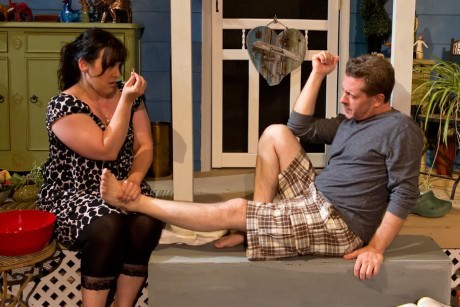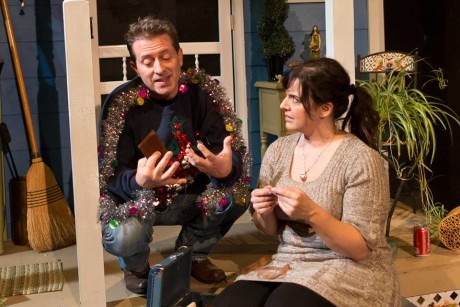I have now seen 26 entries in the Women’s Voices Theater Festival, and six have shot to the top of my list in terms of writing I most admired. (I mean the playwriting itself, not the production values, however excellent those were as well.) For me the test of a terrific script in performance is always: Does its language go off in my brain as I’m hearing it—speech by speech, scene by scene? And does its craft, content, originality, and voice rivet me?
My faves so far include five I have reviewed for DC Theater Arts—Animal, Night Falls on the Blue Planet, Roe (a staged reading), Queens Girl in the World, and The Dealer of Ballynafeigh—and one I have not, Maytag Virgin by Audrey Cefaly (which was just recently “Helen Hayes Recommended”). This was my first time seeing Cefaly’s writing on stage, and it was one of those experiences of an artist’s work that make me want to see everything they do.
John: I loved your play Maytag Virgin. I saw it as a “civilian,” meaning I wasn’t there to write about it, but I’ve been raving about it to friends. So thanks for this chance to talk about it!

Audrey: Oh, you’re very welcome! And thanks for spreading the word. I’m glad you enjoyed it.
You’ve said, “The world is in a lot of pain. We need stories of healing.” Would you say more about how you see Maytag Virgin as such a story, and what made you want to tell it?
I’ve always been interested in stories of longing. I have a natural inclination to embrace those around me who are suffering and so my writing is an outcrop of that tendency. At first glance, Maytag Virgin seems as if it is a story about death and grief, but at its core, it’s really a love story. The characters of Lizzy and Jack are both reeling from tremendous loss and they are kind of thrust together at the very moment their worlds have been ripped apart. But that pairing is more of a device to get them to each other, to allow them to connect through a shared heartache and to maybe find some absolution from their own perceived transgressions.
One of my favorite moments in the show comes at the end of Act I. Jack and Lizzy are sitting out on their porches at night as a thunderstorm approaches. When the deluge finally hits them, they are each lost in thought…each in their own little world on opposite sides of the stage, but experiencing the same torrent of emotion and release. This water motif is carried throughout the play as a nod to the spiritual properties of baptism as well as a reminder of the cataclysmic forces that build and level us.
There are a lot of people in the world like Jack and Lizzy who are adrift, unmoored, and looking around for something that feels like home. Maytag says…yeah, and you know what? That’s kinda beautiful. It’s beautiful because we often find ourselves at the bottom—at our worst—at the very moment we are doing our damndest to love someone or to love someone through the hell of life. Those noble efforts, that drudgery…that’s what love is. And too often, in those “moments” we forget to love ourselves, we forget to ask for the love we need, we forget to breathe. We convince ourselves it will always be this way…that we are unlovable or that we have run out of chances. The rejection of this fallacy is really at the core of every single love story ever told. It is why we cry at movies and why we watch our favorite romances over and over again, pausing at those favorite moments…the ones that speak to us. We are—all of us—longing to feel alive and loved…and to connect.

The performances by Gillian Shelly (as Lizzy) and William Hardy (as Jack) are exquisitely moving. And each character as written seemed to “go against type,” or challenge conventional expectations, in a really sensitive, surprising, and deeply truthful way. I’d like to start by asking you about Lizzy, a woman whose heart has been hurt—damaged, if you will—yet she emerges from that pain, and somehow her character arc left me with a soulful sense of uplift I did not see coming. Would you talk about her, and how you found her character?
That’s so very kind of you to say, John. Thank you. Lizzy is a ball of energy and light, a giver and a nurturer, always tending to others. She also has some big secrets. Her friends and colleagues and the folks at church…they all believe she is grieving over the death of her husband Jesse, but she is hiding a big part of herself and she’s full of shame over it. In the Bible belt, good Protestant women like her are taught to keep it all in, to keep moving, to put family above self and to go to God with their problems. So, for Lizzy, coming clean about who she is and what she’s holding in is a very tall mountain for her and quite naturally, she resists it. Every time Jack (her new neighbor) gets a little too close, she tries to flatten him. At one point, she even talks about building a fence between their houses and he quite pointedly asks about her “mending wall” and wants to know what exactly it is she’s trying to “wall in.” She hits him with a look that would kill a lesser man. But this passion, this fire, is one that can only be elicited by someone who has gotten “in,” so to speak, ya know? It is through Jack’s eyes, really, that we see how perfectly “broken” she is. And instead of running in the other direction, he doubles down and only wants more of it. He loves how alive she is, her passion and her honesty. He embraces the parts of her that she hates the most, which is kind of terrifying for Lizzy because for the first time in her life, she has to be fully and completely honest with another human being. These kinds of characters call to me. I love exploring their brokenness and finding their soft spots, exposing them by degrees through dialogue and silence, and watching how they behave when they believe nobody is watching.
The character of Jack really moved me as well. As written he’s “a good man”: sympathetic, sensitive, smart. He too harbors hurts, but that has not impeded his emotional intelligence—which right there distinguishes him from a lot of other local men who might have moved in next door to Lizzy. In Jack’s character arc you seemed to me to be modeling a sort of man who not only turns out to be surprisingly good for Lizzy but who the world could use more of. Would you talk about him, and how you see him?
I knew from moment one that this would be a love story. And I wanted a man deserving of Lizzy. It was important to me that Jack not crowd her, that he allow her space and room to grieve. He has not dated anyone since the death of his own wife, Amy, and I wanted the audience to know that he adored his wife, that he has an earnest heart, and that he has the capacity to love deeply. So as I developed his character, I tried to reveal his way of thinking about women. He tells Lizzy about a date he went on with a woman named Daphne and how he passed up the chance to be with her. He then tells her that he put an end to it by making a phone call, which is atypical of how “dating” seems to go these days. It is the singularity of that gesture—a phone call—that speaks volumes about his character. It shows that he is a protector, that he respects women, and that he’s not afraid to wait for something real and meaningful.
Jack also has a tenderness…a quiet gentle way about him. He’s a listener and he lets Lizzy know that he has noticed her beauty and that she should recognize it in herself. That gift of observation is a tremendously powerful thing. I don’t really believe in sin, I’m not religious. But I’m convinced that if sin exists, it’s the idea that a human being might recognize the virtue in another…and remain silent. That’s a whole world in your hands. A single, random word of kindness might make the difference in life or death. I believe we are all connected in this world…that which lifts me, lifts you. And I know this may sound silly, but that’s kind of what Maytag is. It’s a hug. It’s a way of saying, I see you’re broken, but look, so am I.
Lastly—switching gears a little from that wonderful expression of human worth—I’d like to ask you for little practical shop talk—in particular about your direction of Maytag Virgin, which felt flawless, exactly and specifically right at every moment of the play. I cannot imagine another director doing your script more justice. But if I may: How in the world did you do that!? For instance, how did your writer self and your director self get along during rehearsals? Did you do any rewriting during the process? How did the actors relate to you (whether as director or writer), and how was that different from what’s typical when only the director communicates directly with the actors and then the director and writer go off and have a huddle? I’ve seen absolutely brilliant results—such as Life Sucks and Maytag Virgin—when a playwright directs his or her own play. But more often I’ve left the theater thinking the director had indulged the writer to the play’s detriment. You clearly steered clear of that fate! How?
It is funny that you mention Life Sucks. That play, the writing and its direction, was an inspiration to me. I remember sitting there watching it, trying to borrow some ideas for Maytag. Huge props to Aaron Posner on that. I hope to one day talk with him in person about his Chekhov renderings. I love how inventive he is. I love how he keeps the levity while driving the action. I love how his writing, which is delightful, teeters between the spare and the outrageous and the suspense that it creates. I love how unpredictable it is. And yet, I found myself deeply invested in the characters.
I am also a huge fan of Martin McDonagh. I love how he keeps me guessing and laughing throughout. If you can get an audience laughing, they will follow you anywhere. With Maytag it’s been so very validating to be commended on the direction, because that writer/director combo is often frowned upon. There’s this very sad idea that writers can’t be objective enough, that they should instead hand their work over to someone else for deployment. I just don’t agree with that assertion. There are many wonderful examples of writers who are highly effective in rendering their own material for stage and screen. Playwriting cannot happen in a vacuum. At its best…it is a true collaboration among writers, actors, and designers. When a writer serves also as director, there are no filters, no roadblocks…it gives them total creative control, which is quite a luxury. I cannot stress enough how rich that conduit is…everything from little comments, snippets of ideas here and there that might open up a whole new way of looking at a scene, a missed entrance or some tangled blocking can actually make the scene better…those happy accidents are quite magical. A writer has to be open to that. And years of directing my own work has taught me that there is only so much I can create with paper and ink. The magic happens in rehearsals. And I try to capture as much of that as I can and weave it back into my writing.
Gillian and Will signed on to the project over a year ago. We had many readings and discussions during that time (we’re still having them, actually). I tried to layer more with every rewrite and really listen to their feedback and strip away whatever was in their way so they didn’t have to trip over the language to get the work done. To their credit, they played along at every turn, even making line adjustments after we went into production. They understand about the musicality of the language and have a real appreciation for how the tiniest edit can open up whole moments of tension and subtext. I can’t say enough good things about our team. We are all grieving about the show coming to a close. It’s gonna hurt.

I so appreciate the insights you’ve shared here, Audrey. I could tell Maytag Virgin came from a deep place of emotional truth-telling as well as a mountain of writerly gifts. It is truly a beautiful work. And it has been an honor to hear you tell of your process, your passion, and your principles as its writer and director.
Now I want to see Maytag Virgin again!
Maytag Virgin plays from October 2-November 1, 2015 at Quotidian Theatre performing at The Writer’s Center – 4508 Walsh Street, in Bethesda, MD. For tickets, call the box office (301) 816-1023, or purchase them online.
LINKS:
Natalie Rine’s review of ‘Maytag Virgin.’
Audrey Cefaly’s New Southern Drama ‘Maytag Virgin’ Opens This Friday, 10/2 at Quotidian Theatre Company as Part of the Women’s Voices Theater Festival.






I did see MAYTAG VIRGIN again, and it moved me even more than the first time. It goes to the heart and soul as does nothing else I’ve seen in the Women’s Voices Theater Festival. IMHO Audrey Cefaly has created in MAYTAG VIRGIN one of theater’s most profound love stories between a woman and man. I cannot ATM think of any other play whose insights and revelations about the possibility of such a connection are so important to experience and understand.